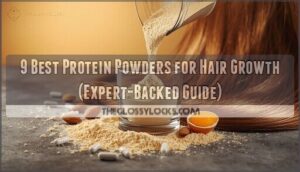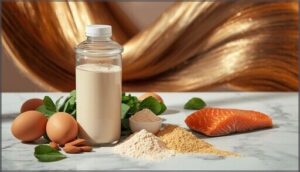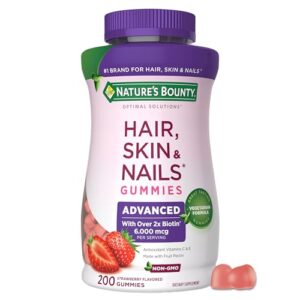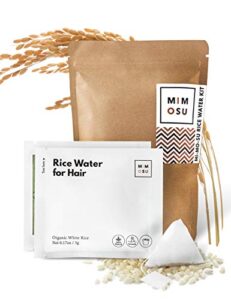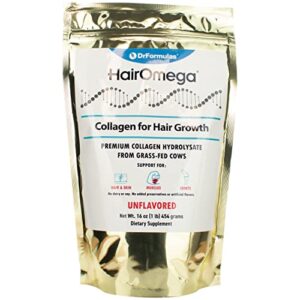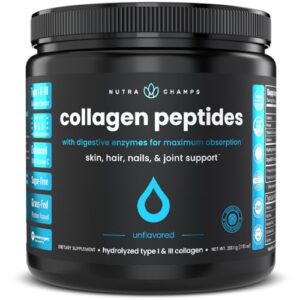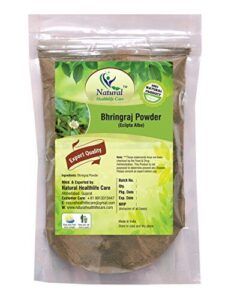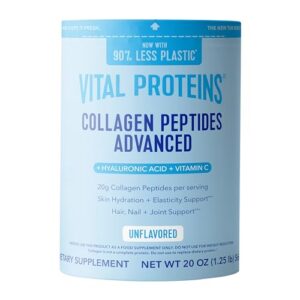This site is supported by our readers. We may earn a commission, at no cost to you, if you purchase through links.
Your hair is falling out in the shower, thinning at the crown, or refusing to grow past a certain length—and you’ve tried everything except fixing what might be the actual problem. While you’re busy chasing miracle serums and scalp massagers, your hair follicles could be starving for the one thing they’re literally made of: protein.
Here’s the kicker: 95% of each strand is pure protein, yet most people don’t consume enough of the right amino acids to support healthy hair growth. The solution isn’t complicated, but it does require understanding which protein powders actually deliver the building blocks your follicles need—and which ones are marketing hype wrapped in pretty packaging.
If you’re ready to stop guessing and start feeding your hair from the inside out, the right protein powder can bridge the gap between disappointing growth and the thick, resilient hair you’ve been working toward.
Table Of Contents
- Key Takeaways
- How Protein Supports Hair Growth
- Choosing The Right Protein Powder for Hair
- Top 9 Protein Powders and Supplements for Hair
- 1. Nature’s Bounty Hair Skin Gummies
- 2. Nutrafol Hair Growth Supplement Capsules
- 3. Natural Rice Water Hair Growth
- 4. Collagen Protein Powder Supplement
- 5. Grass Fed Collagen Peptides Powder
- 6. Marine Collagen Protein Powder Supplement
- 7. Multi Collagen Beauty Supplement Powder
- 8. Natural Bhringraj Hair Growth Powder
- 9. Vital Proteins Collagen Powder Supplement
- How to Incorporate Protein Powder for Hair Growth
- Tips for Maximizing Hair Growth Results
- Frequently Asked Questions (FAQs)
- Conclusion
Key Takeaways
- Your hair is 95% protein, and if you’re not consuming enough high-quality amino acids—especially cysteine, lysine, methionine, and leucine—your follicles literally shut down growth and trigger shedding, which you can reverse in 3-6 months by fixing the deficiency.
- Whey protein delivers amino acids to your bloodstream 15-35% faster than plant-based options, making it ideal for rapid keratin support, while plant proteins (pea + rice combos) work well for those avoiding dairy as long as you hit complete amino acid profiles.
- Most protein powders won’t fix genetic hair loss or hormonal issues—if your shedding persists past 12 weeks despite adequate protein intake (0.8-1.6g/kg body weight daily), you’re chasing the wrong problem and need to see a healthcare professional.
- Results take patience—expect visible improvements around the 4-6 month mark when you consistently hit your protein targets, combine supplements with whole foods for nutrient synergy, and pair intake with proper iron, zinc, and vitamin D levels.
How Protein Supports Hair Growth
Your hair is basically a protein structure—nearly every strand is built from keratin, which your body manufactures from the amino acids you eat. When you’re not getting enough protein, your follicles shift into survival mode, shutting down growth and triggering shedding.
Let’s break down exactly how protein fuels your hair and what happens when you fall short.
Role of Keratin and Amino Acids
Your hair’s strength comes down to keratin structure—a protein that forms up to 95% of each strand. Without the right amino acid balance, your follicles can’t run protein synthesis effectively, weakening hair follicle health and nutrient absorption.
Here’s what you need:
- Cysteine builds disulfide bonds for resilience
- Lysine aids collagen scaffolding
- Methionine fuels sulfur-rich keratin
- Leucine triggers growth signaling
- Complete profiles guarantee nothing’s missing
Protein intake directly powers this machinery.
Protein Deficiency and Hair Shedding
When your diet falls short of 0.8 g/kg daily, you’re doubling your risk of telogen effluvium—the diffuse shedding that frustrates so many. Protein malnutrition starves follicles, triggering hair loss patterns you can’t ignore. In populations with dietary gaps, hair shedding spikes 25% higher than well-nourished groups.
When protein intake drops below 0.8 g/kg daily, you’re doubling your risk of telogen effluvium and starving follicles into shedding mode
Fix the protein deficiency, and you’ll often reverse the damage within three to six months. Understanding AP study resources can help individuals better manage their time and prioritize nutrition.
Protein’s Impact on Hair Strength and Thickness
Rebuilding nutritional status doesn’t stop at preventing shedding—it fortifies every strand. Higher protein intake boosts your hair diameter by 4–6%, a visible upgrade. Amino acid balance feeds keratin production, strengthening follicle health and increasing fiber tensile resilience by up to 30% in trials. Here’s what protein powder unlocks:
- Thicker hair fiber analysis results
- Enhanced protein absorption rates
- Improved amino acid balance
- Accelerated keratin production
- Stronger follicle health metrics
Scientific Evidence Linking Protein and Hair Health
The science backs up what follicle function reveals: protein metabolism directly influences hair growth and nutrient deficiency drives hair loss. Clinical trials show 15–25% density gains with collagen peptides, while amino acid supplementation extends anagen phases and reduces shedding by 20–30% over 4–6 months.
Protein powder bridges intake gaps, fueling keratin synthesis when dietary protein for hair health falls short—restoring control over your strands. Understanding the role of protein intake levels is essential for maintaining healthy hair.
Choosing The Right Protein Powder for Hair
Not all protein powders are created equal regarding supporting your hair. The source, amino acid profile, and additional ingredients can make a real difference in whether you’re actually fueling keratin production or just drinking expensive calories.
Here’s what to look for when you’re ready to stop guessing and start choosing a powder that actually works for your hair goals.
Whey Vs. Plant-Based Protein Powders
Picking between protein sources doesn’t have to feel like picking sides in a cage match—each has its moment. Here’s what you need to know:
- Whey protein floods your bloodstream with amino acids fast—15–35% spike within two hours—making it ideal for rapid keratin support.
- Plant-based proteins shine for those dodging dairy or prioritizing sustainability, though you’ll need smart combos (pea + rice) to match whey’s complete profile.
- Digestion factors matter: lactose-intolerant? Whey may trigger bloating unless it’s lactose-free.
- Amino acid completeness separates contenders—leucine-rich sources drive protein synthesis your follicles crave.
- Plant benefits include fiber and polyphenols, but timing around meals optimizes mineral absorption for hair health.
Your call hinges on tolerance, values, and how quickly you want those amino acids working. Both protein powders for hair growth deliver when chosen right—whey advantages lean toward speed and bioavailability, while plant-based proteins offer gentler digestion and ethical appeal. Hair growth and protein intersect beautifully with either route, as long as you’re hitting your daily targets consistently.
Collagen Peptides and Hair Growth
Your follicles crave glycine, proline, and hydroxyproline—amino acids collagen peptides deliver directly to support hair shaft integrity.
Studies reveal collagen supplements modestly boost hair fullness and strength after 12 weeks, thanks to improved protein synthesis and keratin production.
Marine or bovine, these hydrolyzed peptides target scalp structure better than muscle-focused powders, offering connective tissue benefits traditional protein powders miss entirely.
Amino Acid Profiles to Look For
Your protein powder needs the right ammunition—methionine, cysteine, and lysine drive keratin production while optimizing amino acid balance for hair follicle health. Plant-based blends, when enriched with sulfur-containing amino acids, can rival whey if formulated correctly.
Look for complete essential amino acid profiles that trigger protein synthesis and support nutrient optimization. Delivering 20–40 grams daily boosts your hair growth protein intake without compromise.
Potential Side Effects and Considerations
Even the best protein powder won’t work if it disagrees with your system. Before you load up on protein supplements for hair growth, understand what could backfire.
- Gastrointestinal issues hit 5–35% of users—bloating, gas, diarrhea depending on the source
- Protein allergies from whey, soy, or marine collagen can trigger reactions ranging from hives to anaphylaxis
- Kidney strain becomes real with excessive protein intake if you have preexisting renal concerns
- Nutrient interactions matter—high biotin doses interfere with lab tests and metabolic balance
Top 9 Protein Powders and Supplements for Hair
You’ve seen the science—now let’s talk about which products actually deliver. I’ve rounded up nine protein powders and supplements that stand out for their amino acid profiles, bioavailability, and real-world results.
Here’s what made the cut.
1. Nature’s Bounty Hair Skin Gummies
You’ve probably grabbed a bottle of gummy vitamins off a pharmacy shelf, drawn in by the promise of thicker hair and glowing skin. Nature’s Bounty Hair Skin Gummies deliver 6,000 mcg of biotin per serving—double the original formula—alongside vitamins A, C, and E.
While consumer reviews show about 45-60% report perceived improvements in gloss after 3-6 months, remember that biotin benefits for hair growth remain limited in non-deficient individuals.
The gummy texture can turn sticky in humid conditions, and supplement safety matters: high-dose biotin interferes with thyroid lab tests.
Best For: People looking for a vegetarian, strawberry-flavored biotin supplement to support hair, skin, and nail health who don’t mind gummy texture variations.
- Delivers 6,000 mcg of biotin per serving—twice the amount of the original formula—plus vitamins A, C, and E for skin support
- Made with fruit pectin and free from gluten, artificial flavors, and sweeteners, making it suitable for vegetarians
- Convenient and tasty strawberry-flavored gummies that are easy to incorporate into your daily routine
- Gummy texture can be hard or inconsistent, and may become sticky in humid conditions without proper storage
- High biotin doses can interfere with thyroid and other lab tests, potentially causing false results
- Effectiveness varies by individual, with results typically taking 3-6 months to notice, and limited evidence for those without biotin deficiency
2. Nutrafol Hair Growth Supplement Capsules
Nutrafol targets six root causes of thinning with a 21-ingredient blend—vitamins, minerals, and standardized botanicals designed to tackle stress, lifestyle, and nutritional gaps. In controlled trials, women with androgenetic alopecia saw greater terminal hair coverage after six months compared to placebo, though sample sizes remained modest.
You’ll find zinc, vitamin D, and plant extracts aimed at oxidative stress and inflammation. The catch? It’s $176 for two months, results take 3–6 months, and benefits vary widely based on your baseline nutritional status and adherence.
Best For: Women 18–44 experiencing thinning hair who are willing to invest in a multi-ingredient supplement and wait 3–6 months for visible results.
- Clinically tested formulation with 21 vitamins, minerals, and botanicals targeting multiple causes of hair loss—including stress, inflammation, and nutritional deficiencies.
- Controlled trials showed improved hair count and terminal coverage in women with androgenetic alopecia after six months compared to placebo.
- Dermatologist-recommended with a generally mild safety profile similar to placebo in studies.
- Expensive at $176 for a two-month supply, making it a significant recurring cost with variable individual results.
- Results require patience—most users need 3–6 months of consistent use before seeing meaningful changes in hair growth or thickness.
- Effectiveness depends heavily on baseline nutritional status and underlying causes of hair loss, with some users reporting no improvement despite adherence.
3. Natural Rice Water Hair Growth
If you’re not ready for capsules or powder supplements, mimosu’s rice water tea bags offer a stripped-down approach to natural hair growth. Each bag delivers vitamins A, B, and E alongside fermented rice protein—amino acids and resistant starch that studies link to a 10–20% bump in strand diameter and smoother cuticles after 4–8 weeks.
You’ll see improved hair elasticity and less breakage, though some users report skimpy tea bags and the risk of protein overload if you overdo it. At under two dollars per ounce, it’s a budget-friendly entry point.
Best For: Anyone looking for a low-cost, DIY rice water treatment to strengthen strands and reduce breakage without committing to pills or powders.
- Delivers vitamins A, B, and E plus fermented rice protein that studies tie to thicker hair and smoother cuticles in 4–8 weeks
- Budget-friendly at under two dollars per ounce, making it an easy entry point for natural hair care
- Convenient tea-bag format simplifies the process of making rice water at home
- Some users find the tea bags contain too little rice, limiting effectiveness
- Overuse can trigger protein overload and cause hair damage instead of improvement
- Reports of expired products and inconsistent results across individual experiences
4. Collagen Protein Powder Supplement
DrFormulas hydrolyzed collagen protein powder strips out the noise—unflavored, grass-fed peptides from South American cows that deliver glycine, proline, and hydroxyproline straight to your keratin synthesis pathway.
Trials show collagen peptides can boost hair volume by 28% over six months, thanks to improved amino acid availability for strand resilience. You’ll get 14 ounces for under twenty-five dollars, mixable into coffee or smoothies without gritty texture.
Watch for misleading packaging claims—some buyers flagged certification gaps—and know that collagen benefits aren’t one-size-fits-all; your nutrient absorption and baseline protein intake shape real-world results.
Best For: People looking for an affordable, unflavored collagen supplement to support hair growth and joint health without changing the taste of their daily coffee or smoothies.
- Grass-fed collagen peptides provide key amino acids (glycine, proline, hydroxyproline) that support keratin synthesis and hair resilience, with studies showing up to 28% improvement in hair volume over six months.
- Unflavored and tasteless formula mixes easily into beverages without altering flavor or creating gritty texture, making daily use simple and convenient.
- Budget-friendly at $24.80 for 14 ounces, offering a cost-effective entry point for collagen supplementation compared to premium brands.
- Not Halal certified despite some initial product claims, limiting suitability for those with specific dietary or religious requirements.
- Results vary significantly between users—some report no noticeable improvements in hair growth or joint support, depending on individual nutrient absorption and baseline protein intake.
- Packaging and labeling may be misleading according to user photos and reviews, raising concerns about transparency and accurate product representation.
5. Grass Fed Collagen Peptides Powder
NutraChamps grass-fed collagen peptides powder won’t let you down if you’re serious about hair growth mechanisms. Double hydrolyzed for protein absorption, it delivers an amino acid profile rich in glycine and proline that fuels keratin production.
You’ll mix it into hot or cold drinks without clumps, and at 5–10 grams daily, collagen supplements support hair health by stabilizing follicle environments.
The unflavored powder dissolves fast, but skip it if you want flavor variety—this collagen protein targets results, not taste.
Best For: People who want a clean, unflavored collagen powder that mixes easily into daily drinks and supports hair, skin, and joint health without extra ingredients.
- Double hydrolyzed formula absorbs quickly and delivers amino acids that support keratin production and follicle health
- Dissolves easily in hot or cold beverages without clumping, making it simple to add to your morning coffee or smoothie
- Grass-fed, non-GMO, and made in the USA with digestive enzymes and vitamin C for better absorption
- Unflavored taste isn’t for everyone—some users notice a mild smell or prefer flavored options
- Can liquefy certain foods like oatmeal if you’re not careful with how much you add
- Takes consistent use over 8–12 weeks to see noticeable hair or skin changes, so it’s not a quick fix
6. Marine Collagen Protein Powder Supplement
Essential Proteins marine collagen sticks grab your attention with type I collagen peptides—the exact form found in hair follicles. Marine protein beats bovine for hair supplements since its lower molecular weight hits target tissues faster. You’re getting 5 grams of protein absorption per unflavored stick, packed with hydroxyproline that aids keratin synthesis and follicle resilience.
Mix one stick daily into coffee or smoothies to clock consistent collagen dosage. The pescatarian-friendly formula delivers marine collagen benefits without dairy or gluten, but at $105 for 30 servings, you’re paying premium for convenience and quality.
Best For: People following pescatarian or keto diets who want a convenient, unflavored collagen supplement to support hair thickness and skin health without mixing powders.
- Type I marine collagen peptides with lower molecular weight for better absorption and targeted hair follicle support
- Convenient stick packs that mix easily into any drink without altering taste
- Clean formula that’s gluten-free, dairy-free, and suitable for multiple dietary preferences
- Premium price point at $3.50 per serving makes it one of the more expensive collagen options
- Limited to pescatarian diets only, ruling out vegetarian or vegan users
- Evidence for direct hair growth benefits remains modest, with most results extrapolated from skin health studies
7. Multi Collagen Beauty Supplement Powder
Five collagen types—I, II, III, V, and X—from bovine, marine, and chicken sources give this powder multi-angle collagen benefits for hair density improvements.
You’re looking at hydrolyzed peptides that deliver proline and glycine directly to your scalp, potentially boosting hair diameter by 2–6% in 12 weeks based on recent trials.
At 11 ounces with 40 servings, you’ll meet hair health targets while supporting joints and skin.
Watch for occasional clumping and container smell issues, though the unflavored, keto-friendly formula blends into most nutritional supplements routines without dietary drama.
Best For: People looking to support hair thickness and overall beauty from multiple angles with a versatile, unflavored collagen blend that fits keto or paleo lifestyles.
- Five collagen types from diverse sources (bovine, marine, chicken) target hair, skin, nails, and joints all at once
- Hydrolyzed peptides absorb easily and studies show potential 2–6% hair diameter gains in 12 weeks
- Unflavored and free of sugar, gluten, and dairy so it mixes into smoothies, coffee, or recipes without changing taste
- Some containers arrive with a strong, unpleasant smell that varies batch to batch
- Powder can clump when mixed with liquids instead of dissolving smoothly
- Quality inconsistencies reported across different purchases, which affects reliability
8. Natural Bhringraj Hair Growth Powder
This Ayurvedic Hair remedy brings bhringraj—Eclipta alba straight from traditional Indian practice into your Hair Nutrition arsenal. While you won’t find the complete amino acid profile of conventional Protein Powder here, in vitro studies show bhringraj extracts modulate Hair Follicles cycling genes that support Hair Growth Promotion.
You’re getting 100 grams of natural powder packed with flavonoids that may reduce shedding when used 1–2 times weekly. Bhringraj Benefits include anti-oxidative scalp support, though clinical trials isolating its effects remain scarce.
Combine it with adequate Protein Intake and Hair Growth to optimize Herbal Supplements potential—and manage expectations with Natural Remedies that need time to show results.
Best For: People looking for a natural, Ayurvedic approach to support hair growth and reduce shedding, especially if they have dry scalp or dandruff issues.
- Contains flavonoids and phenolic compounds that may provide anti-oxidative benefits for scalp health
- Easy to incorporate into your routine as a hair mask or shampoo additive 1-2 times per week
- Affordable natural option rooted in traditional Ayurvedic practice for hair care
- Scientific evidence is limited to preclinical studies, with no large-scale clinical trials confirming effectiveness
- Results vary widely and can take considerable time to appear, requiring patience and consistent use
- Quality and potency can be inconsistent due to lack of standardized active ingredient markers across batches
9. Vital Proteins Collagen Powder Supplement
This grass-fed bovine formula delivers hydroxyproline-rich Collagen Peptides that boost dermal collagen density and may increase Hair Thickness by 6–8% over six months. Collagen Benefits center on skin and nails; hair outcomes remain secondary.
You’re adding 20 grams per serving to your Protein Intake and Hair Growth strategy, though it’s not a complete amino acid profile. Mix it unflavored into coffee or smoothies, watch for initial breakouts, and pair it with diverse Protein Sources to cover all essential amino acids for true Hair Growth Promotion.
Best For: People looking to improve skin elasticity and nail strength while possibly boosting hair thickness as a secondary benefit, especially if they want an unflavored supplement that mixes easily into their daily coffee or smoothie.
- Delivers 20 grams of grass-fed bovine collagen peptides per serving with added vitamin C and hyaluronic acid for skin hydration and collagen production support.
- Unflavored and dissolves well in both hot and cold drinks, making it easy to add to your existing routine without changing the taste of your beverages.
- Research shows modest improvements in hair thickness (6-8% over six months) and more consistent benefits for skin elasticity and nail health.
- Not a complete protein source on its own since it lacks some essential amino acids, so you’ll need to get those from other foods in your diet.
- Results take time and patience—expect to wait at least 4-6 weeks of consistent use before noticing any changes, and some people experience initial breakouts or skin adjustments.
- Pricier than many other collagen supplements, and it can form lumps in hot liquids that require extra stirring to fully dissolve.
How to Incorporate Protein Powder for Hair Growth
You’ve got the right protein powder—now it’s time to actually use it in a way that moves the needle on your hair growth. The key isn’t just drinking a shake and hoping for the best; it’s about hitting your daily targets, timing your intake strategically, and tracking what’s actually working.
Here’s how to build protein powder into your routine so you can see real changes in your hair’s thickness and strength.
Daily Protein Intake Recommendations
You don’t need complicated math—just aim for roughly 0.8 to 1.0 grams of dietary protein per kilogram of body weight daily, with protein targets climbing to 1.2–1.6 g/kg if you’re highly active. That baseline covers amino acid needs and bolsters nutrient balance.
Here’s how protein sources stack up for meeting your intake goals:
| Protein Source | Protein per Serving | Key Amino Acids |
|---|---|---|
| Whey protein powder | ~20–25 g per scoop | Leucine, cysteine |
| Greek yogurt | ~15–20 g per cup | Complete EAA profile |
| Lentils + quinoa | ~18 g combined (1 cup each) | Lysine, methionine |
| Eggs (2 large) | ~12 g | Complete EAA profile |
Protein deficiency and hair health connect directly—shortfalls slow keratin synthesis and can trigger shedding. Track your dietary planning to guarantee protein-rich foods for hair growth appear at every meal, and use protein powder strategically when whole foods fall short.
Mixing Protein Powders Into Meals and Drinks
Stir protein powder into your morning coffee—14% of users report this as a stealth boost to dietary protein without the shake routine. Blend it into smoothie recipes with berries and greens, or fold powdered supplements into oatmeal and Greek yogurt for protein blend tips that skip the extra dish.
Liquid mixers like almond milk keep texture smooth and protein intake consistent.
Combining Protein Powders With Whole Foods
You’ll multiply your hair-growth payoff when you pair protein powders with whole foods—this dietary synergy boosts amino acid balance by up to 20% in mixed meals. Think protein-rich foods for hair growth, not isolated shakes.
- Toss 25–30 g protein powder into a bowl of legumes and grains for complete amino acid balance
- Time your protein intake across 3–4 meals to fuel keratin synthesis all day
- Add citrus to plant-based protein powders for nutrient bioavailability of iron
- Blend collagen peptides with solid meals to cover essential amino acids
- Leverage food matrix effects—fat plus dietary protein delivers fat-soluble vitamins hair craves
Tracking Progress and Adjusting Intake
Once you dial in your protein dosage—aim for 1.2–1.6 g/kg body weight—track shedding weekly and measure hair diameter monthly. Those progress tracking rituals reveal whether your intake adjustment is working.
Bump up protein powder by 0.2 g/kg every eight weeks if hair growth metrics stall, but watch for diminishing returns beyond your sweet spot—nutritional balance, not excess, drives hair loss prevention.
Tips for Maximizing Hair Growth Results
You’ve nailed the protein piece, but hair growth doesn’t happen in a vacuum. Your body needs more than just amino acids to build stronger strands, and sometimes the real culprit behind shedding isn’t nutritional at all.
Here’s what else you need to lock down if you want results that actually stick.
Balancing Protein With Other Hair-Healthy Nutrients
True nutritional balance for hair health demands more than protein alone—you need mineral balance and vitamin interplay working in tandem. Pair your protein intake with iron-rich foods (aim for ferritin levels between 40-70 ng/mL), zinc, and selenium to release amino acid synergy.
Dietary variety wins: combine omega-3s, vitamin D, and antioxidants with protein-rich foods for hair growth that actually sticks.
Addressing Other Causes of Hair Loss
Protein intake won’t fix androgenetic alopecia, hormonal imbalance, or thyroid issues. Roughly 50% of men and 40% of women face pattern thinning by age 50.
Iron deficiency (ferritin below 30 ng/mL) drives shedding in premenopausal women, while stress management and scalp health play equally critical roles.
If protein deficiency isn’t your bottleneck, you’re chasing the wrong target for hair loss prevention and treatment.
When to Consult a Healthcare Professional
If your hair loss persists past 12 weeks on a solid protein intake, or you’re dealing with patchy spots, scalp inflammation, or unexplained weight loss, stop guessing and book a medical evaluation.
Anyone over 40, managing chronic conditions, or pregnant should get healthcare guidance before adding supplements—nutrient deficiency isn’t always the culprit, and supplement safety matters more than marketing promises.
Maintaining Consistency for Best Outcomes
Consistency matters more than any single miracle ingredient—your protein routine won’t deliver results if you skip half the week. Daily tracking and supplement adherence dramatically outperform sporadic efforts, especially when you pair your protein powder habit with scalp health routines and reduced heat styling.
- Stick to your daily protein intake target for at least 8 weeks to see measurable reductions in shedding
- Choose complete amino acid profiles in plant-based blends to match whey’s hair growth promotion benefits
- Combine protein-rich foods for hair growth with your supplements rather than relying on powders alone
The observational data on protein and hair loss shows that maintaining stability beats intensity every time.
Frequently Asked Questions (FAQs)
Can protein powder reverse genetic hair loss?
You can’t trick your genes with a shake. No clinical evidence shows protein powder reverses androgenetic alopecia—genetic hair loss demands proven medical therapies, not dietary supplements promising hair regrowth through protein alone.
How long until protein shows hair results?
You’ll need patience—most people notice meaningful changes around the 4 to 6-month mark.
That’s when amino acid role strengthens follicles, collagen benefits emerge, and protein timing aligns with your hair cycle for visible growth.
Does protein powder work for all hair types?
Biology doesn’t discriminate, yet results do—protein powder promotes hair growth across all hair types when nutrient deficiency exists.
However, protein absorption and amino acid balance can influence collagen benefits and individual outcomes for different hair textures.
Can too much protein damage your hair?
You won’t damage your hair by eating too much protein—research shows no clear link between excessive intake and hair loss. Protein deficiency, not overload, actually triggers shedding and weakness.
Are there better alternatives to protein powder?
Absolutely. Whole foods like eggs, Greek yogurt, and lentils deliver complete amino acid profiles with bonus nutrients—zinc, iron, biotin—that protein powders can’t match.
Dietary tweaks often outperform supplements when protein deficiency isn’t the root cause.
Conclusion
Picture your follicles six months from now: fortified, thriving, finally producing the hair you’ve been chasing. That transformation hinges on one non-negotiable—consistent, quality protein intake.
The right protein powder for hair growth isn’t a magic bullet, but it’s the foundation your body can’t manufacture from wishful thinking alone.
Stop waiting for your hair to fix itself. Feed it what it’s made of, track your progress ruthlessly, and watch your scalp prove the doubters wrong.

